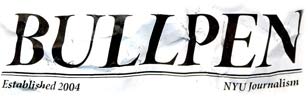Lecture: Clyde and Maggie Haberman

New York Times columnist Clyde Haberman and his daughter, New York Daily News reporter Maggie Haberman talked to students on February 15.
Photo: Megan Thompson.
If anyone wanted to make the case that writing talent is all in the genes, Clyde Haberman and his daughter Maggie would be Exhibit A. The Habermans are both successful journalists at major New York City papers: Clyde writes the “NYC” column for The New York Times and Maggie is a staff reporter for The New York Daily News. On February 15, 2006, the duo shared some of their most memorable journalistic experiences with an audience of students and faculty in the atrium of New York University’s Department of Journalism.
Studying chemistry at City College of New York in the early ’60s, Clyde had planned on pursuing a career in science. But he switched courses when he stumbled on an ad soliciting contributions to the student newspaper, “The Campus.” “At that point, I barely read the papers,” he said. “But I figured, ‘I like to write and I’m more than reasonably curious.’”
Clyde never formally studied journalism, but he doesn’t see this is a significant disadvantage. “Journalism is just people talking to people,” he said. “I don’t know if anyone can truly teach you how to write, but you can improve on anything with experience.”
He’s got no shortage of that. Clyde spent about 13 years as a New York Times foreign correspondent, “which,” he noted, “is just a fancy way of saying, ‘a reporter who doesn’t speak the language of where he’s living.’”
Initially based in Japan, he spent five years as the Times’s Tokyo bureau chief. He was reassigned to Rome in 1988. When Communism began to collapse, in 1989, the Times didn’t have many bureaus in Eastern Europe. Reporters throughout Western Europe were charged with covering the political upheaval in the Eastern Bloc.
The extreme poverty he witnessed in Eastern European countries, such as Romania and Bulgaria, “jolted” him, he said. The supermarkets often contained nothing but “a couple wheels of cheese and maybe a few loaves of bread,” he recalled. Witnessing such deprivation firsthand “does toughen you,” Clyde said.
In 1991, he was reassigned to Jerusalem. He recalled visiting Deheishe, a Palestinian refugee camp on the West Bank. His guide asked him if these were the most deplorable conditions he’d ever witnessed. His answer was both honest and unwelcome. While life in the camp was far from ideal, the supermarkets were full, he noted, which made the Palestinians better off than the vast majority of Eastern Europeans. “People always want you to think their story is the worst, the best, the most horrible,” Clyde said.
When he returned to Manhattan in 1995, Clyde took up his current post, writing the “NYC” column. Over the past 11 years, he’s developed a reputation for depicting life in New York with a mixture of humor and insight. In “City Cries Out: Hang Up And Drive,” Clyde took on the issue of driving while gabbing. He recounted the story of a businessman who lit up a cigarette as a tactic to end a cab driver’s phone conversation. The cabbie told him it was illegal to smoke; the guy told the cabbie it was illegal to be on the phone. In the end, both the phone conversation and the cigarette were extinguished. “Brilliant!” Clyde proclaimed, “If only we could afford a pack of cigarettes in New York, we might try it ourselves.”
Although many of his ideas spring from current events, Clyde tends to take a more light-hearted approach than other Metro section writers. He acknowledges that one of his great strengths as a writer is humor. “I can write funny, which is hard,” he said, so “I feel obligated to lighten it up.”
His wit was apparent when asked if he has had any conflicts with his daughter Maggie, in light of the fact that she works for a competing paper. “I’ve never had to knock her down yet,” he said, laughing. But Maggie admits there’s “no love lost” between their employers.
Maggie, like her father, “fell into reporting by accident.” She studied creative writing at Sarah Lawrence College, but struggled to find a job after graduating in the mid ’90s. After months of interviewing for jobs at magazines around New York City, she settled on a position as a clerk at The New York Post, which she described as “the lowest-paying job in journalism.” Maggie thrived on the fast pace of the newsroom. “You have a daily deadline, and every day is a clean slate,” she said.
The job can be challenging at times. Her most difficult moments as a reporter have been accidentally telling the next-of-kin of a death, prior to police notification. But even on less stressful days, Maggie faces the demands of juggling career and family. Four months ago, she gave birth to her first child: a son named Max. She now has to add child-care issues and guilt about being away him to her list of concerns. Balancing everything is hard, she admitted, “but that’s reality.”
The Habermans seem determined to spare 4-month-old Max from taking the roundabout route into journalism. He has already appeared in one of Clyde’s columns, “Baby on Board, And Cabby On Cellphone.” And, according to his grandfather, little Max already possesses all of the qualities necessary to get along in the newsroom: he has a generally agreeable attitude, but understands the value of “a well-placed, well-timed temper tantrum.”

